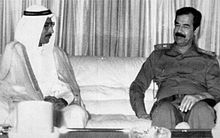Alaa Hussein Ali
Alaa Hussein Ali ( Arabic علاء حسين علي, DMG ʿAlāʾ Ḥusain ʿAlī ; * 1949 in Kuwait City ) briefly served as Prime Minister of Kuwait and Deputy Prime Minister of Iraq . At the beginning of the Iraqi occupation from August 2 to 8, 1990, he was the first head of government of a republic in the history of Kuwait .
Life
Early years
Alaa Hussein Ali grew up in Kuwait when Kuwait and Baghdad were still jointly under British influence, then studied in Baghdad and was a member of the ruling Ba'ath Party there . As well as having two citizenships, he had two wives - one Kuwaiti and one Iraqi.
People's Republic of Kuwait
After his return home, as a lieutenant in 1990, he headed the so-called coup attempt , which was calculated from the start on Iraqi intervention. A small group of anti-monarchist officers and soldiers called Saddam Hussein's troops waiting behind the border into the country as requested. Iraq's president immediately promoted Alaa Hussein to colonel and made him prime minister, defense minister and interior minister of the "provisional government of free Kuwait" . On behalf of Saddam Hussein, he was allowed to overthrow the emir, proclaim the Republic of Kuwait and nationalize the oil wells. A week later he had to announce the annexation of Kuwait to Iraq and rose to the position of Iraqi deputy prime minister. Most of the other 21,000 Kuwaiti military officials did not want to fight their former Iraqi allies either. However, they did not want to join the “coup of revolutionary forces” - unlike the Palestinian guest workers, republican Kuwait and parts of the Shiite minority. The Bedouins (especially Anaiza), who always lived on both sides of the border anyway, also supported the Anschluss. With the reconquest of Kuwait and the restoration of the pre-revolutionary order by the US allies, many only had to flee to Iraq, as did Alaa Hussein Ali.
Life in exile
According to Iraqi opposition members, Ali, who was also disparagingly referred to as a “Kuwaiti quisling ” , had distanced himself from foster father Saddam Hussein from 1994 onwards. In 1998 he managed to escape. He and his family were given asylum in Norway under a false name . Why he later left this safe haven remains a mystery. Allegedly, the Kuwaiti embassy had given him the prospect of sparing himself if he was used against his former patron. His Iraqi wife remained skeptical in Norway, while the Kuwaiti wife accompanied him. Both were arrested on arrival in Kuwait.
Condemnation in Kuwait
Alaa's attempt to appeal the death sentence , which was passed in absentia in 1993, failed, and the execution was ordered in May 2000 . The death penalty was commuted to life imprisonment in March 2001 .
Alaa had argued in vain that the Iraqis had been blackmailed with the lives of his family and forced to cooperate. The other eight Kuwaiti officers in the puppet government had in turn accused Alaa Hussein Ali of blackmailing her in this way. In contrast to Alaa, who also surrendered without a fight in 1990, were acquitted and rehabilitated or properly retired.
literature
- New Germany : Short process? Iraq's former governor surrendered himself. Berlin, January 26, 2000
Footnotes
Web links
| personal data | |
|---|---|
| SURNAME | Alaa Hussein Ali |
| ALTERNATIVE NAMES | al-Jabir, Alaa Hussein Ali al-Chafaji |
| BRIEF DESCRIPTION | Kuwaiti politician, Prime Minister of Kuwait, Deputy Prime Minister of Iraq |
| DATE OF BIRTH | 1949 |
| PLACE OF BIRTH | Kuwait City |
